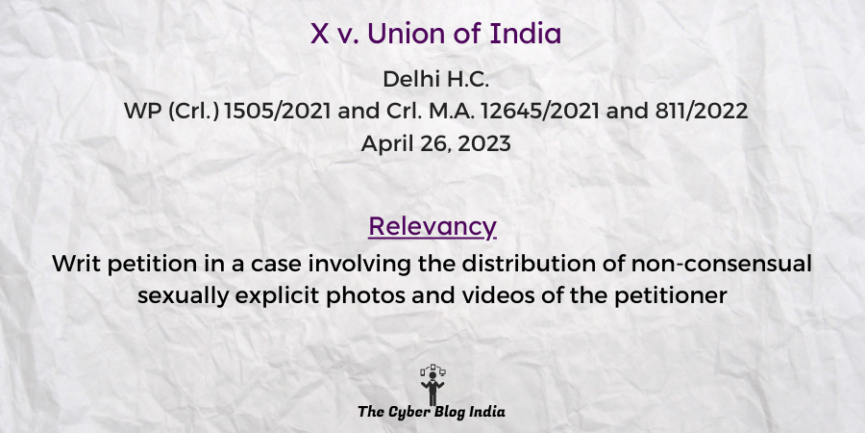X v. Union of India

X v. Union of India
In the High Court of Delhi
WP (Crl.) 1505/2021 and Crl. M.A. 12645/2021 and 811/2022
Before Justice Subramonium Prasad
Decided on April 26, 2023
Relevancy of the Case: Writ petition in a case involving the distribution of non-consensual sexually explicit photos and videos of the petitioner
Statutes and Provisions Involved
- The Information Technology Act, 2000 (Section 2, 66E, 67, 67A, 67B, 67C, 69, 69A, 79)
- The Information Technology (Intermediary Guidelines and Digital Media Ethics Code) Rules, 2021 (Rule 2, 3, 4)
- The Constitution of India, 1950 (Article 14, 19, 21, 226)
- The Code of Criminal Procedure, 1973 (Section 482)
Relevant Facts of the Case
- The petitioner is a married woman who became acquainted with the accused through social media and developed a close bond.
- Taking advantage of her living alone, the accused raped the petitioner and also took multiple sexually explicit images. Subsequently, the petitioner filed an FIR with the police.
- The accused threatened to leak the images on various pornographic websites if money was not paid; therefore, she obliged until her funds were depleted.
- Shortly, however, the accused leaked her pictures on various pornographic social media platforms. The petitioner filed a fresh complaint and approached all the grievance redressal portals of the respondent websites and search engines to remove her photos, which did not take action.
- On further investigation, the police found that the accused persons had ₹23,99,182/- in cash and around 83,000 objectionable photographs of various women.
Prominent Arguments by the Advocates
- The Amicus Curiae submitted that the respondent intermediaries possess the required technology to identify child sexual abuse material (CSAM). Therefore, they must deploy this technology.
- The second respondent’s counsel submitted that the Ministry of Home Affairs has set up the National Cyber Crime Reporting Portal (NCCRP), available at cybercrime.gov.in.
- The counsel appearing for the third (Google), fourth (Microsoft), and fifth (YouTube) respondents submitted that they have the required technology. However, they can only be deployed through a court or government order. Their proactive data removal would breach Article 19(1)(a). On Google’s behalf, the counsel also stated that search engines have lesser power to remove content. Search engines are not websites’ primary owners and only provide results based on indexed URLs.
Opinion of the Bench
- The intermediaries and the State made no collaborative efforts.
- A list of recommendations and directions was issued to the Ministry of Electronics and Information Technology (MEITY) and Delhi Police.
Final Decision
- The court disposed of the writ petition and any pending applications thereof.
Ananya Dixit, an undergraduate student at Symbiosis Law School, Hyderabad, Nikita D’Lima, an undergraduate student at NMIMS School of Law, Navi Mumbai, and Risha Thomre Rajani, an undergraduate student at NMIMS Kirit P. Mehta School of Law, Mumbai, prepared this case summary during their internship with The Cyber Blog India in May/June 2023.
